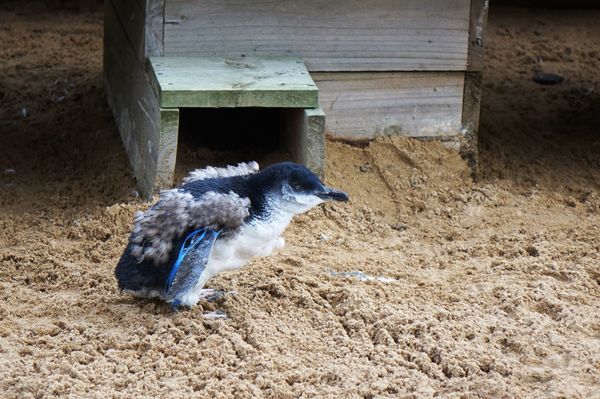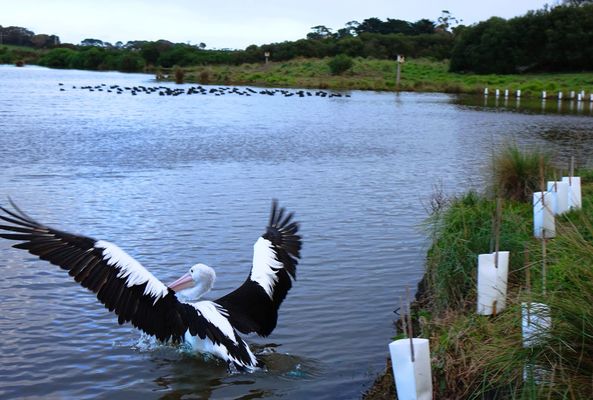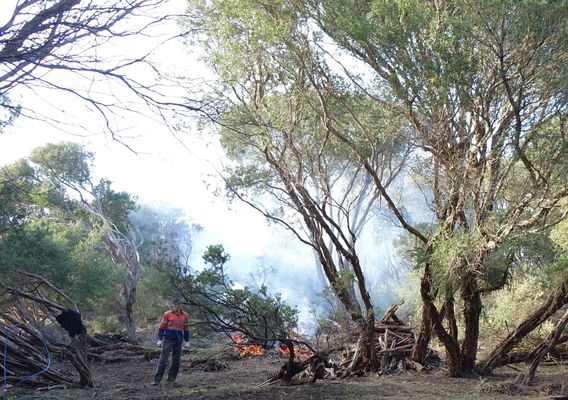Words and images supplied by Phillip Island Nature Parks
Most people think of Phillip Island’s beautiful beaches, lazy summer holidays and, of course, the penguins.
But there’s a special group of people whose responses are more likely to include topics such as eradicating feral animals, revegetation and wildlife rescue.
These are the Environment Rangers from Phillip Island Nature Parks.
Since their introduction to Australia in the mid-1800s, foxes have played a significant role in the decline of many native species.
On Phillip Island, foxes are the little penguin’s biggest threat on land, having been responsible for many penguin deaths, with a single fox capable of killing up to 30 penguins a night.
In 2006 the nature parks adopted a Fox Eradication Project incorporating a range of integrated techniques such as night-time searches, fixed cameras and track searches.
This program was further enhanced in 2014 with the introduction of fox detection dogs, Sam and Jazz. Alongside their handler, the dogs have achieved excellent results, covering over 2700km of survey areas in 2015 alone.
This dedicated team, along with an integrated approach to eradication, has been responsible for reducing the fox population on the island from an estimated 60 to 70 at the start of the program, to what is estimated to be less than six individuals now, with no physical evidence of foxes found since August 2015.
Removal of pest animals is only part of the story, of course, and needs to be combined with revegetation works to protect wildlife habitat.
The major focus of the nature parks’ rangers over the past 12 months has been on increasing biodiversity as well as plant numbers to maintain sustainable habitats.
To that end 55,000 grasses, shrubs, trees and ground covers were planted during the last year by rangers and a group of volunteers.
As these plantings mature over time, the selected vegetation is able to out-compete the weeds, allowing native plants to self-generate and maintain a sustainable habitat for the island’s wildlife.
This wildlife is at the heart of operations carried out by nature parks rangers in the area of wildlife rescue and rehabilitation.
Highly trained rangers are on duty 365 days a year, responding to reports of sick or injured wildlife on Phillip Island, receiving 820 calls for assistance last year alone.
Thanks to the generosity of donors, and the successful fund-raising activities of the Penguin Foundation such as the adopt-a-penguin program, the nature parks opened a state-of-theaart rehabilitation clinic in 2011 within the Penguin Parade precinct.
This clinic is the hub of wildlife care undertaken by nature parks rangers on the island, and treats approximately 500 animals each year.
Rangers also carry out an important rescue program when the short-tailed shearwaters commence their annual migratory journey to Alaska each April.
The shearwater chicks have difficulty flying and can be attracted to street lights, often finding themselves on the roads at the mercy of traffic.
Rangers and volunteers rescued about 360 shearwaters last year, giving them another chance to complete their long migration.
As a world leader in eco-tourism, Phillip Island Nature Parks takes its role of conservation and managing the environment very seriously and is at the forefront of world’s best practice when it comes to caring for the natural habitat and environment on Phillip Island.
So when next enjoying watching the penguins waddle ashore at the Penguin Parade or lazing on one of the wonderful beaches, spare a thought for the rangers, the unsung heroes who are on the front line of maintaining this much loved holiday destination.
For more information on Phillip Island Nature Parks, visit www.penguins.org.au.










